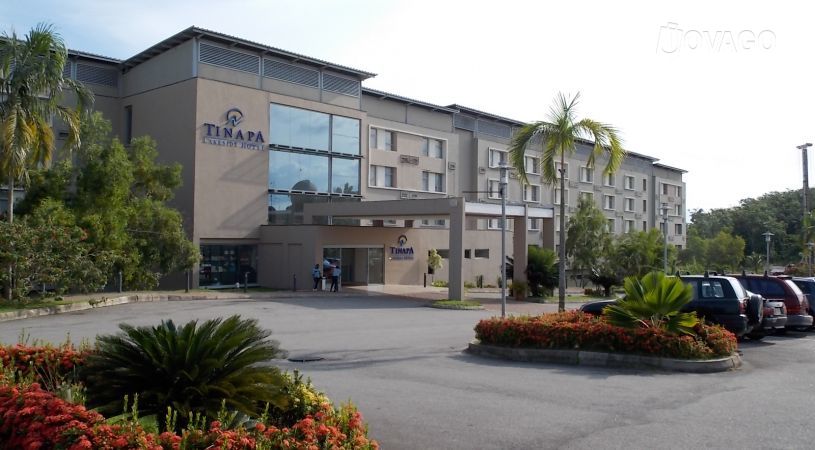- Tinapa, Nigeria’s $450m White Elephant
With its futuristic film studios, luxury shops and elevated light railway, Tinapa should be a showcase of Nigerian dynamism, a commercial hub for West Africa raking in millions of dollars.
But 10 years after it opened, the resort in south-east Nigeria is a ghost town and has become a symbol of monumental waste.
Its majestic contours and avant-garde domes rise defiantly out of the bush and palm trees. At the entrance, a giant signboard proclaims “Tinapa back on track!”
But the few visitors who venture inside are quickly disillusioned.
Apart from a few idle employees, not a soul stirs in the endless aisles of shops and warehouses that should have made the capital of Cross River state, Calabar, famous across Nigeria’s south.
“It’s empty there, we have no clients, it’s like a cemetery,” said one shop assistant in Da Viva, which sells the popular brand of wrapper skirts.
“Many have left already,” he added, pointing to shuttered premises.
A huge supermarket still displays clothes, furniture and foreign-made knick-knacks but in virtual darkness: the electricity was cut off some time ago.
Inside, an old man snoozes in the suffocating heat.
Tinapa, with its 80,000 square metres (861,000 square feet) of warehouses and shops, cost $450 million (413 million euros) to build.
But it has become a financial black hole for its backers.
– Economic development –
At the turn of the century, Nigeria was on the point of becoming Africa’s biggest economy and leading oil producer. Newly returned to civilian rule, everything seemed possible.
A handful of businessmen and architects got together and imagined an international centre of commerce and tourism in a free-trade zone.
Nigeria’s biggest banks fell over themselves to finance the project, which was opened in 2007.
“At that time, everyone was excited. Tinapa was going to boost economic development of the whole region and create thousands of jobs,” said Bassey Ndem, who was in charge of the project.
It aimed to attract Nigerian millionaires, who ordinarily jetted off to Dubai or London to go shopping, as well as make Cross River a commercial crossroads on the Atlantic coast.
A plush 242-room hotel with a view over the lagoon and a water park with slides were built to cater for the cream of high society and their families.
Alongside luxury tourism, imported goods would provide for Nigeria and its neighbours such as Cameroon, Chad and Niger, competing with the country’s commercial capital, Lagos.
“Everything was going well at first,” said Ndem. “At the peak, in 2009, we generated $30 million of revenue. But we faced a lot of resistance from the customs.
“They really didn’t want the tax-free zone to work.”
Goods were supposed to be exempt from import duties in the free-trade zone.
But from the beginning, the customs — which has a reputation for rampant corruption — blocked containers destined for Tinapa in the ports, paralysing business.
– Top down, trickle up –
Ndem left in 2012. None of his successors has managed to get Tinapa off the ground.
“There was clearly a lack of political will” to make the project succeed, he said, describing himself as angry and frustrated at a “wasted opportunity”.
For the economist and blogger Nonso Obikili, Tinapa’s downfall was largely because of a lack of existing infrastructure to transport goods: bad roads and an average-sized port.
“It was a wide project conceived with the deep sea port, which was supposed to enable big ships to come to Calabar,” said Obikili.
“It was the responsibility of the federal government but finally it wasn’t done,” he told AFP.
In the end, no big-name jeweller or pret-a-porter line wanted to invest in the paradise promised by its promoters and the hotel remains desperately empty.
The cinema studios have likewise been unable to attract Nollywood’s stars, who have largely preferred to stay in Lagos.
In “Looking for Transwonderland: Travels in Nigeria”, the British-Nigerian author Noo Saro-Wiwa castigates the leaders in the country of her birth.
Few of Nigeria’s nearly 190 million inhabitants have benefited from the riches brought by oil; most still live in extreme poverty.
“This top-down approach to boosting Calabar’s economy seemed hollow,” she wrote.
“I’d heard Nigerian politicians’ endless talk about theme parks, tourist resorts, shopping malls and their ‘trickle down’ effects on the economy.
“But there’s no such thing as ‘trickle down’ in Nigeria — money trickles upwards or evaporates on contact with air,” Saro-Wiwa wrote in 2012.

 Naira4 weeks ago
Naira4 weeks ago
 Naira4 weeks ago
Naira4 weeks ago
 Travel4 weeks ago
Travel4 weeks ago
 Naira3 weeks ago
Naira3 weeks ago
 Jobs4 weeks ago
Jobs4 weeks ago
 Naira4 weeks ago
Naira4 weeks ago
 Investment4 weeks ago
Investment4 weeks ago
 Travel4 weeks ago
Travel4 weeks ago


























